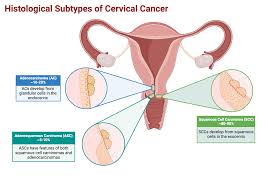Cervical Cancer (Squamous Cell, Adenocarcinoma)

Overview
Cervical cancer begins in the cervix, the lower part of the uterus connecting to the vagina. It is largely preventable and highly treatable when detected early. Most cases are caused by persistent infection with high-risk human papillomavirus (HPV) types.
Main histologic types:
- Squamous cell carcinoma (most common)
- Adenocarcinoma
- Adenosquamous carcinoma (rare)
Symptoms
- Abnormal vaginal bleeding (e.g., after intercourse, between periods)
- Unusual vaginal discharge
- Pelvic pain or pain during intercourse
- In advanced cases: leg swelling, back pain, weight loss
Causes & Risk Factors
- Persistent HPV infection (types 16, 18)
- Early sexual activity and multiple partners
- Smoking
- Immunosuppression (e.g., HIV)
- Infrequent or no Pap/HPV testing
- Long-term use of oral contraceptives
Diagnosis
- Pap smear (cytology)
- HPV DNA test
- Colposcopy and cervical biopsy
- Imaging: CT, MRI, PET-CT (staging)
- Pelvic examination under anesthesia (for locally advanced disease)
Treatment Options
- Early-stage:
- Surgery (conization, trachelectomy, hysterectomy)
- Radiation therapy
- Locally advanced:
- Chemoradiation (cisplatin-based)
- Advanced/metastatic:
- Chemotherapy
- Targeted therapy (e.g., bevacizumab)
- Immunotherapy (e.g., pembrolizumab for PD-L1+ tumors)
Prognosis
- Depends on stage at diagnosis
- 5-year survival:
- Stage I: ~90%
- Stage II: ~60–80%
- Stage III–IV: <50%
- Regular screening dramatically improves outcomes
Living with this Cancer Type
- Fertility-sparing options for early-stage patients
- Sexual and urinary health management
- Psychosocial support
- Surveillance with Pap/HPV testing and imaging
Prevention & Screening
- HPV vaccination
- Regular Pap smears and HPV testing
- Smoking cessation
- Safe sex practices
FAQs
Q: Can cervical cancer be prevented?
A: Yes, through HPV vaccination and regular screening.
Q: Is it contagious?
A: The cancer is not contagious, but HPV (a virus) is sexually transmitted.
Q: Can I still have children?
A: Fertility may be preserved in early stages with conservative surgery.
Resources
- Cervical Cancer-Free Coalition
- American Society of Clinical Oncology (ASCO)
- WHO: Cervical Cancer Elimination Initiative
- ClinicalTrials.gov
Understand Precision Testing
Learn how liquid biopsy and chemo sensitivity testing can personalize your treatment plan.
Make Informed Decisions
Gain knowledge to actively participate in treatment discussions with your healthcare team.
Improve Treatment Outcomes
Discover how precision medicine and metabolic therapies can enhance treatment effectiveness.
Start Your Educational Journey Today
Empower yourself with knowledge about precision metabolic oncology and take an active role in your cancer care journey.
Need More Information?
Our team of oncology experts is here to help you understand your diagnosis and treatment options.
